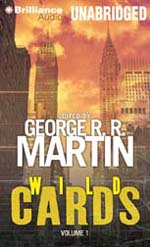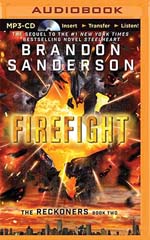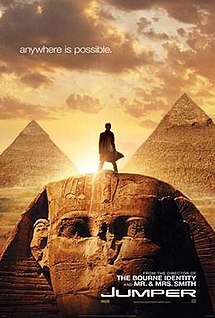
 Wild Cards (Wild Cards #1)
Wild Cards (Wild Cards #1)
Edited by George R. R. Martin; Read by Luke Daniels
19 hours [UNABRIDGED]
Publisher: Brilliance Audio
Published: November 2011
ISBN: 9781455833009
Themes: / alternate history / superpowers / alien virus / superhero / urban fantasy / science fiction / horror /
Publisher Summary:
In the aftermath of WWII, an alien virus struck the Earth, endowing a handful of survivors with extraordinary powers. Originally published in 1987, the newly expanded saga contains additional original stories by eminent writers.
The stories contained in the audiobook are:
“Prologue” by George R. R. Martin
“Thirty Minutes Over Broadway!” by Howard Waldrop
“The Sleeper” by Roger Zelazny
“Witness” by Walter Jon Williams
“Degradation Rites” by Melinda Snodgrass
“Captain Cathode and the Secret Ace” by Michael Cassutt
“Powers” by David D. Levine
“Shell Games” by George R. R. Martin
“The Long, Dark Night of Fortunato” by Lewis Shiner
“Transfigurations” by Victor Milán
“Down Deep” by Edward Bryant and Leanne C. Harper
“Strings” by Stephen Leigh
“Ghost Girl Takes Manhattan” by Carrie Vaughn
“Comes a Hunter” by John J. Miller
There are also a variety of “Interludes” in between the stories, which are short bits mostly written in the form of newspaper or magazine articles or first-hand witness accounts. These interludes are often used to bridge the narrative with real events from US history, to provide the reader with insight as to the feelings in this “alternate history” type world.
Generally, this is a story of the effects of an alien virus on humanity between the time shortly following World War II through the late 70’s/early 80’s. The virus was brought to earth by aliens from a planet called Takis. It was developed as a device to give Takisians superpowers to be used as a part of large-scale family wars on Takis. The aliens wanted to test it, so sought to release it on Earth, as humans are genetically very similar to Takisians. “Prologue” introduces us to an alien who is called (by the humans, as his name is not well-suited to human speech) Dr. Tachyon and the “Wild Cards” virus. Dr. Tachyon is also a Takisian, but tried to prevent the release of the virus on Earth. “Prologue” sets the scene and tone for the world of the book. It also provides an insight into Dr. Tachyon’s values: he doesn’t ask first for the President of the US, he instead asks for the top scientists and thinkers. This is an obvious nod by George R. R. Martin to those who have true powers in the US.
“Thirty Minutes Over Broadway!” tells the story of Jet Boy, an American superhero, and the release of the Wild Cards virus over Manhattan in September, 1946. Jet Boy is a true hero, an all-American kid who came back from fighting in World War II with a superhero story of his ace flying abilities. He is the only superhero in the book who wasn’t a superhero because of the virus, but because of his innate abilities and selflessness. In a theme that becomes common through the book, the reader is reminded that a hero is a hero because of what they do, not because of their skills. Jet Boy tries—and fails—to stop the virus from being released.
The virus is brutal. It only impacts humans, with no effects on other species. It kills most of its victims, but those who survive (only about a tenth of those exposed to the virus) are not left unscathed. Through the rest of the book, the reader is introduced to various people impacted by the virus. The first stories tell mainly of “Aces,” those who get super powers from the virus (usually in the form of telekinesis and/or greatly enhanced physical abilities. Later, the reader is introduced to the concept of “Jokers,” who become horribly deformed due to the virus. The first interlude presents the concept of “Deuces,” those who get an “ace-like” ability that is not particularly useful, like “Mr. Rainbow,” whose ability is to change the color of his skin.
The narrative takes the reader through time: each story is a snapshot of a period in US history and provides a sort of “alternate history” of how that time may have been different if there had been these Aces and Jokers were around. Some of the early stories, taking place during the era of HUAC and McCarthyism, show how the aces became subjects of witch hunts and were forced into service in the US military or intelligence agencies. Jokers are looked upon as second-class beings, a theme that plays a large role during the stories set in the 60’s and 70’s, mirroring the US Civil Rights Movement. Some of the stories are sad, such as “The Sleeper” and “Witness.” Some are a bit more uplifting and triumphant, such as “Shell Games.” A lot of the stories, especially the later ones, become a bit creepy, with people using their powers for selfish reasons, as in “Strings.”
All in all, Wild Cards serves as an interesting statement on humanity through the guise of a “what if” scenario. All of the stories are eminently believable—at no time did anything that happened seem overwhelmingly unlikely. To some extent, that’s a bit of a sad statement on humanity—as the book goes on, aces and jokers alike seem to be only interested in helping themselves, looking out for their own (often misguided) interests.
The narration, done by Luke Daniels, was pretty good in the audiobook. He had a good speed and good intonation for most of the characters, and it was easy to tell each character apart. As often happens with male narrators trying to do female voices, some of the females sounded whiny, but it wasn’t so over the top so as to be unlistenable. After listening to this narration, I’ll be keeping Luke Daniels on my radar when looking at audiobooks.
Personally, I preferred the stories in the first half of the book to those in the second half. In the second half, the stories got quite a bit darker, more creepy and violent. After the strong lead-in with the Prologue and “Thirty Minutes Over Broadway,” I quite enjoyed the origin stories and the weaving-in of events in US history. As the book progressed, the stories didn’t seem quite as engaging—for one, I actually repeatedly fell asleep while listening, and ended up having rewind and re-listen to some of the others. There was also one story that was too graphic both in terms of sex and violence for me, “The Long, Dark Night of Fortunato” by Lewis Shiner. By the end, I wasn’t interested in more stories of people serving their own interests. There are other books in the series, which I have heard are more like the stories at the end of the book—I’m not sure that they’ll be for me. But I enjoyed this anthology well enough and would recommend it to others interested in a cross of science fiction, general fiction, and horror genres.
Review by terpkristin

 Firefight (The Reckoners #2)
Firefight (The Reckoners #2) Breach Zone (Shadow Ops #3)
Breach Zone (Shadow Ops #3) Jumper (Jumper #1)
Jumper (Jumper #1)
